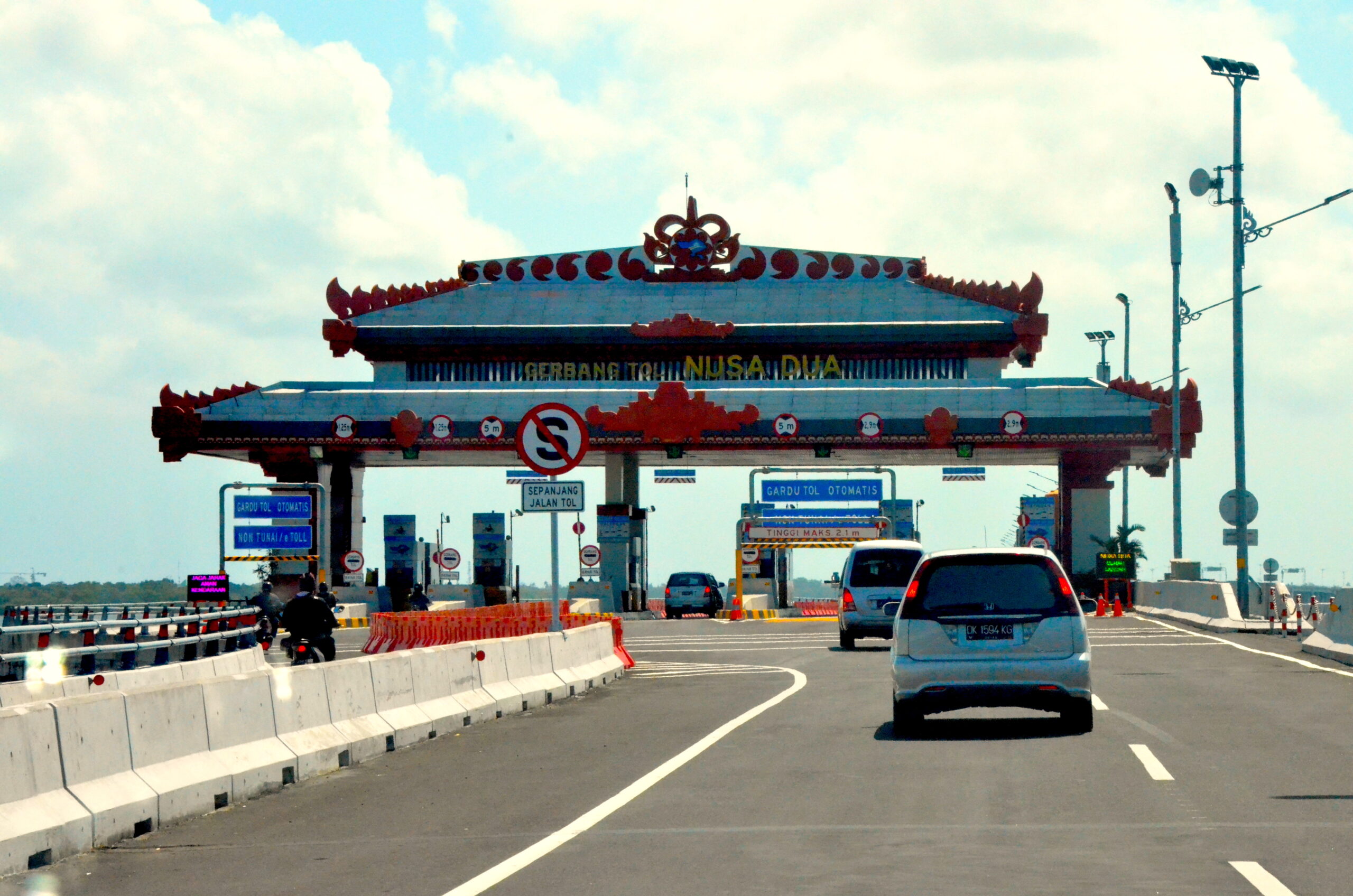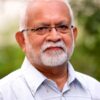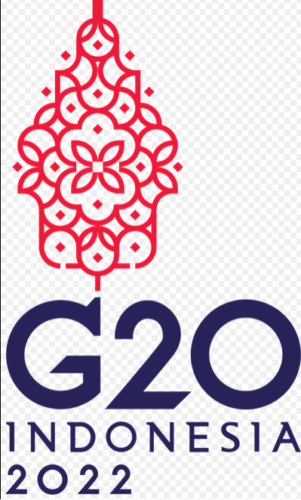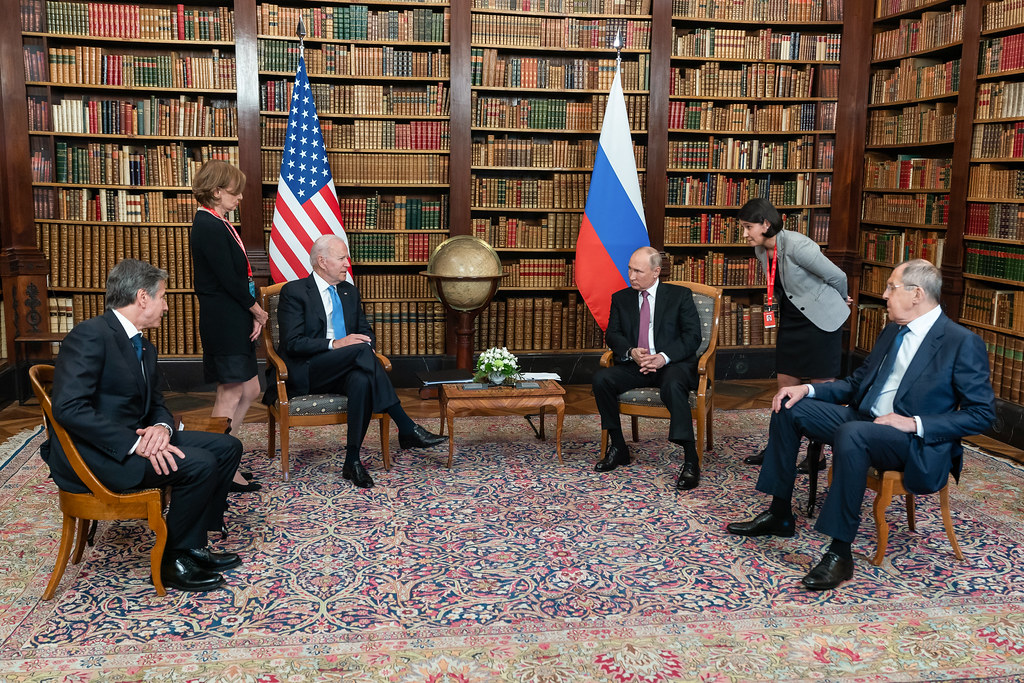M.K. Bhadrakumar says there are discernible signs that both sides are striving to lower tensions as much as they can so as to create a “cordial” enough atmosphere.

Toll plaza in Nusa Dua, Bali, Indonesia, where the G20 summit will be held later in November. (AdriansyahYS, CC BY-SA 4.0, Wikimedia Commons)
By M.K. Bhadrakumar
Peoples Dispatch
 Russian-American summits have a history of calibrated foreplay. As the G20 summit in Bali on Nov. 15-16 draws closer, the big question is still hanging in the air: Will there be a meeting between U.S. President Joe Biden and his Russian counterpart Vladimir Putin on the sidelines of the event?
Russian-American summits have a history of calibrated foreplay. As the G20 summit in Bali on Nov. 15-16 draws closer, the big question is still hanging in the air: Will there be a meeting between U.S. President Joe Biden and his Russian counterpart Vladimir Putin on the sidelines of the event?
From the look of it, a meeting cannot be ruled out. It increasingly seems that the scheduling of such a meeting may even be under discussion between Washington and Moscow.
On Nov. 2, Kremlin spokesman Dmitry Peskov told reporters in Moscow that Putin had a call with Indonesian President Joko Widodo (who is hosting the G20 summit).
Parrying questions, Peskov cryptically added that “we are currently working on a statement” and declined to answer if Putin and Widodo had discussed the Russian president’s possible participation in the G20 summit. Instead, he simply told reporters to wait for an official statement on the phone call.
Russian-American meetings at the highest level are customarily announced simultaneously in the two capitals. The delay in the release of the statement that Peskov referred to can only be taken to mean that consultations are still going on.
 A readout drafted by a Kremlin official would have served the purpose in the normal course on the phone conversation between Putin and Widodo, but in this case, there has been an undue delay while a statement is still under preparation. Given the state of relations between the U.S. and Russia, a unilateral announcement of a Biden-Putin meeting by either side is simply inconceivable.
A readout drafted by a Kremlin official would have served the purpose in the normal course on the phone conversation between Putin and Widodo, but in this case, there has been an undue delay while a statement is still under preparation. Given the state of relations between the U.S. and Russia, a unilateral announcement of a Biden-Putin meeting by either side is simply inconceivable.
Then there are discernible signs that both sides are striving to lower the tensions as much as they can so as to create a “cordial” enough atmosphere. Thus, from the American side, the White House spokesman John Kirby went on record on Wednesday to categorically state that the U.S. does not see any signs that Russia is making preparations to use nuclear weapons.
From the Russian side too, it is apparent that Moscow has virtually ignored the media leaks in the U.S. that American military personnel are on Ukrainian soil on a mission to audit the weaponry given to Kiev to fight the war with the Russian forces. The U.S. has a record of staying put in foreign countries and Moscow is in all likelihood conscious of that. Yet, it is keeping mum.
Statement on Nuclear War
On Tuesday, the Russian Foreign Ministry issued an important statement proposing out of the blue that the atomic powers should “demonstrate in practice” their own commitment to the principle that a nuclear war can never be won and should never be fought as well as “abandon dangerous attempts to infringe on each other’s vital interests, balancing on the brink of direct armed conflict and encouraging provocations with WMD, which can lead to catastrophic consequences.”
The statement reaffirmed categorically that “[u]se of nuclear weapons by Russia is hypothetically allowed only in response to aggression carried out with the use of WMDs, or aggression with the use of conventional weapons when the very existence of the state is threatened.”
Interestingly, International Atomic Energy Agency inspectors on a mission to Ukraine gave a clean chit to Kiev on Wednesday regarding the latter’s “undeclared nuclear activities and materials.” This followed Moscow’s recent allegation that Kiev was working on a “dirty bomb.”
Clearly, there will be no need now for Biden and Putin to squander away their time discussing the spectre of Armageddon if they meet in Bali.
On Thursday, Moscow and Kiev conducted a second major prisoner swap in under a week.
Meanwhile, Russia has returned to the U.N.-brokered grain deal to facilitate the transportation of Ukraine’s produce to the world market. Of course, this followed a written guarantee from Kiev that the humanitarian corridor will not be used for military purposes. Russian Foreign Minister Sergei Lavrov, in turn, expressed appreciation that such an assurance has been held out by Kiev.

U.S. President Joe Biden and Russian President Vladimir Putin meeting in Geneva, June 16, 2021, with U.S. Secretary of State Antony Blinken on left, Russian Foreign Minister Sergei Lavrov, right. (White House/ Adam Schultz)
Neither Moscow nor Washington has shown any inclination to dial up tensions over the Russian allegation regarding the involvement of British intelligence in the sabotage of the Nord Stream gas pipelines and the drone attack on the Russian naval base at Sevastopol.
Curiously, Washington has been somewhat indifferent, while the Russian demarche with the U.K. ambassador on Thursday suggested good behavior by the British intelligence in future and hinted at a desire to move on. Indeed, Russia is not contemplating any retaliation against the U.K.
Quite obviously, if a Biden-Putin meeting takes place, the discussion will be largely devoted to the Ukraine situation. Significantly, the deputy head of the Russian presidential administration, Magomedsalam Magomedov, said Thursday at a public function in Moscow that Putin’s decision to launch the special military operation in Ukraine was not an easy one but he had no other choice given existing dangers.
That said, if a meeting between Biden and Putin were to take place, that would create a piquant situation, insofar as the stated American position all along has been that the U.S. will not discuss Ukraine with Russia without President Volodymyr Zelensky’s participation.
For his part, Zelensky said Thursday Ukraine will not participate in the upcoming G20 summit if Putin also attends. He sounded wary of being left out. One possible way out of the labyrinth would be that Putin also meets Zelensky in Bali.
M.K. Bhadrakumar served for more than 29 years as an Indian Foreign Service officer with postings including India’s ambassador to Turkey and Uzbekistan.
This article is from Peoples Dispatch.
The views expressed are solely those of the author and may or may not reflect those of Consortium News.

Of course it is pure coincidence there is talk of peace on the eve of the mid terms. As Putin once noted the USA is” non agreement capable” . It does all its business down the barrel of a gun.
If only the USA had even one diplomat of the calibre of Mr Bhadrakumar, but the USA does not believe in diplomacy.
That was a rather balanced and objective write-up I must say especially bringing out all the positive moves by the conflicting parties towards easing tensions even while hostilities on the ground and even more within MSM stay very much alive. Still, when I read the accomplished writer’s last paragraph I got totally purplexed and had to scroll back to his first again to reflect on the deeper meanings of “caliberated foreplay”. I must confess I failed to fathom it and I am sure both the prospective, facilitating Indonesian host and the rivalistically-bent guests too would be left purplexed too !
What exactly is Biden and his entourage offering the world other than a basic suicide note. To use an American turn of phrase: ”You cannot be serious.”! Both sides are determined to prevail, but the push seems to be coming from the Americans and their pathetic western allies. Additionally, what the f… does the media think it is doing other than cheerleading for Armageddon! Being the ‘winner’ seems a rather strange concept in this situation. Does anyone other than a homicidal maniac really believe in a winnable global war? The cost of a ‘Rules based’ is also problematic insofar as we will not be able to determine who won?
The USAnians are “not agreement capable”. They always go back on their word (eg. “NATO will not expand one inch East of Germany”) and renege on their signed agreements (eg JCPOA) when it suits them. That is the “international rules based order”. Even more pointless will be talking with a corrupt, demented puppet “leader” of a non-agreement capable Deep State. Nothing the USA says or signs can be trusted. Stashing your foreign reserves in Western banks means they can be stolen at any time. Better Putin stays at home and talks to his goldfish.
From Scott Ritter article, ‘A ‘Dangerous, Bloody & Dirty Game’’:
“The Biden administration two weeks earlier released its 2022 National Security Strategy (NSS), a full-throated defence of the RBIO which all-but declares war on “autocrats” who are “working overtime to undermine democracy.”
Was Biden looking in the mirror when he wrote this revealing conceit? Iran, Venezuela, and Mexico all supported the Allies through WWII with cheap, highly profitable crude. They received poverty, contempt and death squads as reward.
The US, now and always, makes allies of the most corrupt, violent collaborators. Recently, US trained military yahoos have committed 8 coups in West Africa. Of course, military coups are cheaper than honestly negotiating Oil & Gas rights with responsible, democratically elected, popularly supported leadership. ‘Los Zetas’, Mexico’s worst narco gang were trained and armed by US ‘special forces’. Honduras, where democracy was recently restored after a US-OAS coup installed a president and family now facing decades in US prisons for drug trafficking. El Salvador, where ex-President Cristiani is facing murder charges for the executions of 6 Catholic priests, housekeeper and young daughter, that advocated for negotiations and peace. NAYOYO welcomes military coups and death squads everywhere so long as it favours corporate greed and human rights violations that terrify popular dissent. Only the most savage, racist, drug-dealing monsters are embraced as worthy NAYOYO allies because they have NO LOCAL support. These collaborators know their lives and future depend on following CIA instructions. These are only the most recent iteration of Western Quislings put in power to serve US greed.
Vladimir Putin, July 7, 2022: “The initiatives to work together on missile defence have been rejected, warnings about the unacceptability of NATO expansion, especially at he expense of the former Soviet republics, have been ignored.”
The White West has destroyed every chance for peaceful progress. They need Russian enemies more than they need peace or Russian friendship.
Martin Jacques: “At the heart of globalization is a new kind of intolerance in the West towards other cultures, traditions and values, less brutal than in the era of colonialism, but more comprehensive and totalitarian.”
At this point, it seems like a conversation between Putin (who chooses every word carefully and in strategic context–whatever else you may think of him) and Biden (the incoherent and self-righteous hypocrite ever shooting from the lip), while very much needed to dial down the rhetoric, is almost inconceivable. The Russiaphobia-group-think mob in the USA would go completely apoplectic. Biden really needs to appoint a special negotiator (of Chas Freeman goodwill and credentials) to get earnest talks started. Biden, Blinken, et.al., have proven their absolute incompetence at every turn.
Unfortunately our leaders in the west nowadays view common sense as a weakness, and rather than engage with Putin these clowns will try to distance themselves from him in the hope of making him appear isolated, when all that will do is show the rest of the world how far they are behind him.
The USAnians are “not agreement capable”. They always go back on their word (eg. “NATO will not expand one inch East of Germany”) and renege on their signed agreements (eg JCPOA) when it suits them. That is the “international rules based order”. Even more pointless will be talking with the corrupt, senile puppet “leader” of a non-agreement capable Deep State. Nothing the USA says or signs can be trusted. Stashing your foreign reserves in Western banks means they can be stolen at any time. Better Putin stays at home and talks to his goldfish.
Putin meet Zelensky? What for? Thanks for the laugh.
I wondered why this was mentioned. Ze keeps wanting this (as well as waiting for the next Russian president!) but how on earth can Ukraine be counted as one of the G20. It is giving too much importance to 404 which is just the proxy for US to destroy Russia (so it hopes!)
Seriously, what would be the point? I posted the following to CN in March 2021, almost a year before the Ukraine war:
“Realistically, Biden has no intention of doing anything other than non-kinetically attacking Russia for the duration of his administration. It appears that US diplomacy is the only thing not on the table.”
Biden is a deranged old man with an anti-Russian fixation that transcends diplomacy. Any meeting with Putin would be utterly pointless.
Yuck, it would truly be a bad day at work if I was told that as a part of my job I had to meet with Joe Biden. What a lousy way to spend a part of a day. I’d much rather sit under a tree.
I like the idea but neither Biden nor USA, as a whole, has any credibility left.